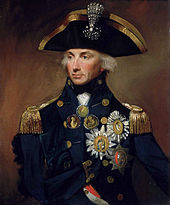John Ferrier
[3][4] The outbreak of the French Revolutionary Wars in 1792 did not immediately lead to further service for Ferrier, and it was not until 1796 that he received a ship, being appointed to command the 64-gun HMS York in April that year.
[5] He commanded her for five years on the West Indies Station, before sailing back to Britain as a convoy escort for 155 merchants, all of which reached their destination safely.
[6] There was no immediate service available after the signing of the Treaty of Amiens later that year, but on the outbreak of the Napoleonic Wars in 1803, Albion became the flagship of Rear-Admiral Sir James Saumarez on the Channel station.
The fleet, under Commodore Nathaniel Dance, had narrowly escaped capture by a powerful French squadron under Rear-Admiral Charles-Alexandre Léon Durand Linois.
On another occasion, having been ordered back to England, Ferrier learnt that the French were attempting to establish themselves in the Persian Gulf with two ships of the line, four frigates and a number of armed vessels.
[7] Ferrier and his crew survived the arduous voyage, eventually reaching the Cape, where the commanding officer there, Vice-Admiral Albemarle Bertie noted that Albion was "a perfect wreck".
[9] He reported that She has lost her mizzen mast and topmast; nineteen of her main deck guns are thrown overboard also; and the ship so leaky and opening so much that she required to be frapped together in three places.
[10] While refitting at the Cape, Ferrier, as the senior officer on the station, presided over the court-martial of several mutineers aboard the recently arrived HMS Nereide, commanded by Captain Robert Corbet.
[12] Ferrier then left the Cape to continue his voyage, and on arriving in England Albion was "found by an official survey, to be literally lashed together; and when her excessive defects were ascertained, it excited the astonishment and admiration of everyone who had an opportunity of examining the means Capt.
[6][7] His obituary recorded that his public character "evinced great punctuality, naval skill, fortitude, resolution, and a steady perseverance, and to a degree which drew forth the admiration of all those with whom he served.
[7] His private life was remarked to be "most unassuming and unostentatious, influenced in all his actions by the very highest sense of honour, and he secretly exercised many acts of bounty and munificence.

